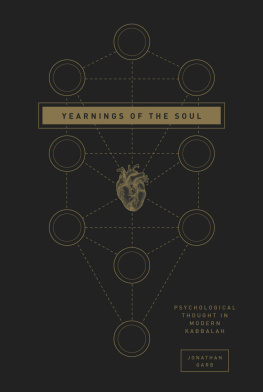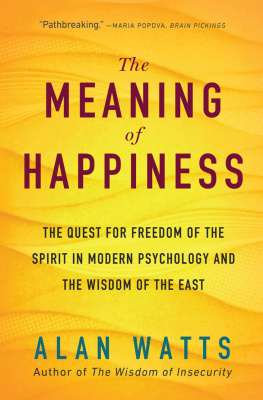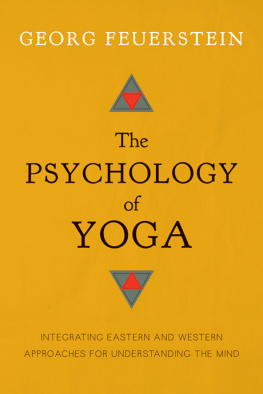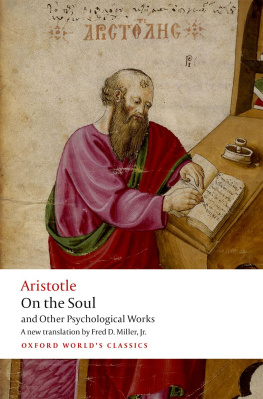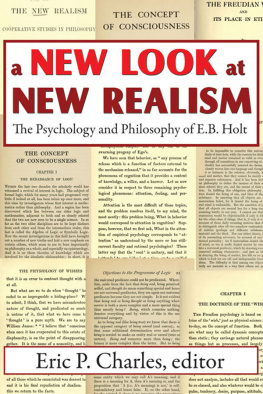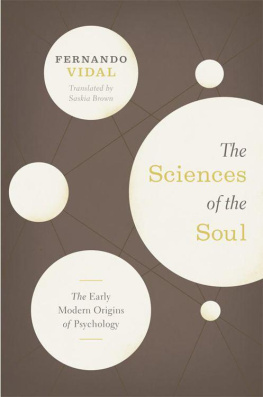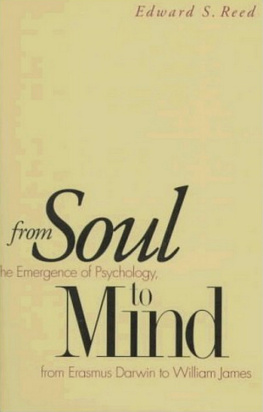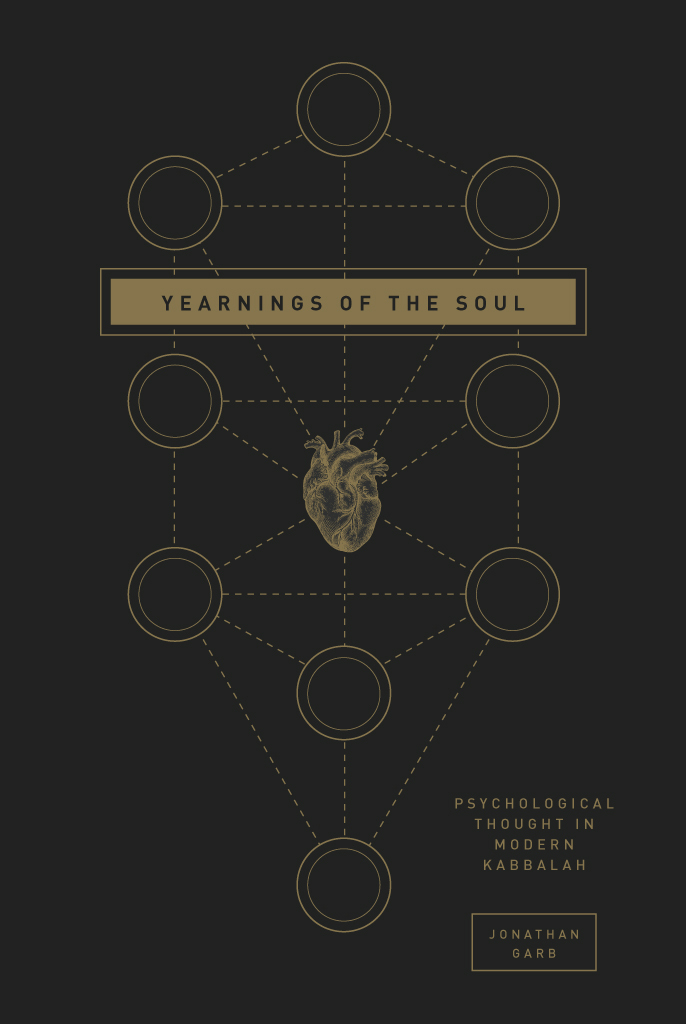JONATHAN GARB is the Gershom Scholem Professor of Kabbalah in the department of Jewish thought at the Hebrew University of Jerusalem. He is the author of several books, most recently Kabbalist in the Heart of the Storm and Shamanic Trance in Modern Kabbalah, the latter also published by the University of Chicago Press.
All rights reserved. Published 2015.
Garb, Jonathan, author.
Yearnings of the soul : psychological thought in modern Kabbalah / Jonathan Garb.
Includes bibliographical references and index.
ISBN 978-0-226-29580-0 (cloth : alk. paper)ISBN 978-0-226-29594-7 (e-book) 1. CabalaPsychological aspects. 2. Psychology. 3. Judaism and psychology. I. Title.
This paper meets the requirements of ANSI/NISO Z39.48-1992 (Permanence of Paper).
As I shall write on its last page, the book was written in joy, as a song of the soul. I wish to thank true friends who have shared of their own creative joy:
My thoughts on the general direction of the book were presented at lectures in 2012 in the Judaic Studies Programs at the Department of Religions at Rice University and Yale University, and many thanks for the learned comments and warm welcome. Parts of the Habad-related portions of the book were presented at the 2012 conferences Habad and the Academe at the University of Pennsylvania and Epic Exposition: The Ayin Bet Discourses and the Mystical Thought of Rabbi Shalom DovBer Schneersohn of Lubavitch (RaShaB) at the Center for Jewish History, and warm thanks are due to the participants.
My wanderyear of the soul in the United States (quoting the late lamented John S. Dunne, as encountering his work and corresponding with him truly transformed the last part of this year) was made possible mostly through the wonderfully challenging, yet supportive atmosphere of the Tikvah Center for Law and Jewish Civilization at New York University, and special thanks are due to its visionary leaders, Moshe Halbertal and Joseph Weiler. My time in New York was greatly enriched by deep conversations with Elliot Wolfson. At the same time, the sabbatical that enabled this year of immersion in the story of the soul was enabled by Hebrew Universitys continued insistence on the vital need for periods of reflection, a laudable policy that will hopefully survive the deadening pressures exerted on academia these days. My ability to join the resources of the excellent American library system with the textual riches of Jerusalem was not the result of any magical feat. Rather, it resulted from the dedicated efforts of an excellent team of young scholars: Avishai Bar-Asher, Ido Harari, Patrick Koch, Yakov Meir, Avital Sharon, and Elchanan Shilo, as well as by the excellent databases created in the Haredi world. My ability to avail myself of these felicitous circumstances was greatly helped by Israel Science Foundation Grant 57/09, as well as by a publication grant from the Hebrew University Humanities Research Committee. I am delighted to thank the University of Chicago Press for placing the book in an ideal home and especially T. David Brent for his broad vision and warm support, Ellen Garnett Kladky for her courteous and thoughtful assistance while escorting the book to production, and Michael Koplow for his sensitive and meticulous editing. Finally, I wish to warmly thank the readers appointed by the press for their learned, helpful, and supportive comments.
During the period of writing, and especially while in the United States, I enjoyed a rich variety of intellectual, spiritual, and political exchanges with many friends and colleagues, especially Daniel Abrams, Michael Vannoy Adams, Shazad Bashir, Courtney Bender, Yoram Bilu, Gad Buchbinder, Jonathan Alexander Daniel, April Deconick, Yaron Ezrahi, David Greetham, Ruth HaCohen, Maoz Kahana, Patrick E. Kelly, Jeffrey Kripal, Tanya M. Lhurmann, Menachem Lorberbaum, David Loy, Shaul Magid, Itzhak Melamed, Christia Mercer, David L. Miller, Dan Nussbaum, William Parsons, William Pinar, Barbara Pitkin, Dan Russell, Bracha Sack, Orit San-Gupta, David Shulman, Jason Siff, Moshe Schatz, Moshe Sluhovsky, Joseph Spinner, Steven P. Weitzman, and Philip Wexler. As always, my reflection on the relationship of textual study and theoretical analysis is greatly indebted to my dialogue with Moshe Idel.
This journey could not have happened without the adventurous spirit of my own soul family. As the Kabbalist R. Isaac Haver wrote, one names sons according to divine inspiration concerning the root of their soul. Ronna and I gave Evyatar David one name each, yet it was she who named Ariel; this can be seen as a sign of the beneficial transitions in the engenderment of the soul in our times.
This book is dedicated to the ongoing uplifting, as the classical Hebrew expression has it, of the fierce and wide-ranging soul of James Hillman, who is one of the righteous of whom it is said that they are even more present in their afterlife than in embodied life.
The Return of the Soul: Psychology and Modern Kabbalah
The Return of the Soul
In the end, it mattered not that you could not close your mind. It was your heart that saved you. ALBUS DUMBLEDORE TO HARRY POTTER
This foray into popular culture not only expresses my sharing of Jeffrey Kripals conviction that this is a central arena for the study of modern mysticism (requiring university professors to study the likes of Professor Xavier, leader
One may indeed ask, as did Julia Kristeva, in what now looks like an innocent, pre-app decade, in the wake of psychiatric medicines, aerobics, and media zapping, does the soul still exist? Kristevas own answer, though acknowledging new maladies not covered in the traditional taxonomy of psychoanalysis, still remains deeply rooted in the Freudian tradition (though via the mediation of Jacques Lacan), the critique of which is one of the main goals of this chapter. Even when acknowledging Talmudic and cabalistic traditions in general terms, her move straight from the Bible to Freud bypasses millennia of Jewish psychology, especially the prolific modern centuries covered here.
However, as we shall see in
This being said, it is not a religious, but a cultural stance, that is championed when Martha Nussbaum, in her inspiring defense of the humanities, repeatedly appeals to the soul: We seem to be forgetting about the soul, about what it is for thought to open out of the soul and connect person to world in a rich, subtle, and complicated manner; about what it is to approach another person as a soul... to talk as someone who has a soul. Nussbaum goes on to say, in a locution that
A striking example of the return of the repressed soul is Victoria Nelsons The Secret Life of Puppets. This beautiful book shows how the soul denied in modern discourse morphed into various artistic, literary, theatrical, and later cinematic forms, especially in the image of artificial humans (the Kabbalistic variant, which is the

